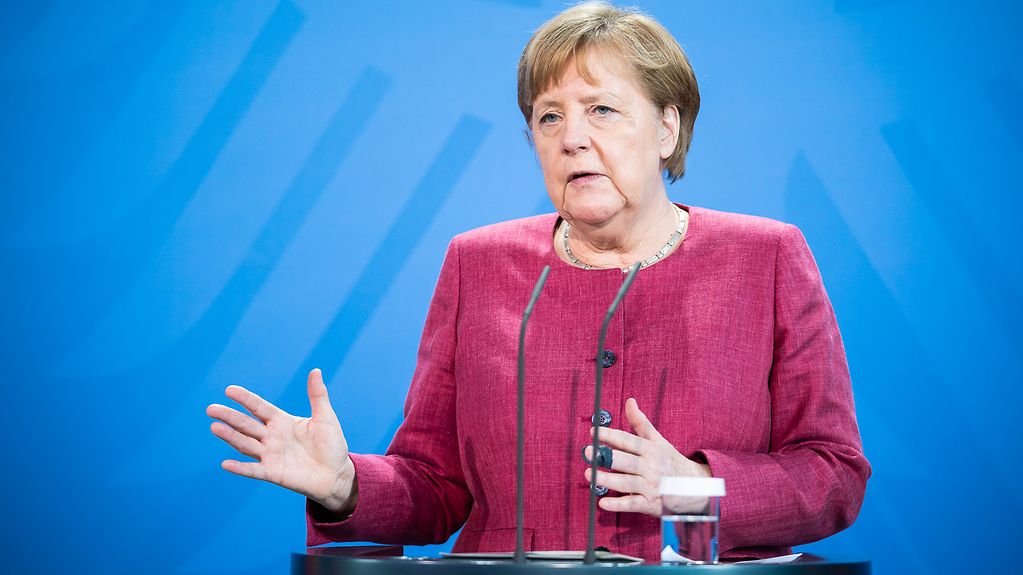Global Health Summit
The heads of state and government of the G20 and other countries, as well as representatives of international health organisations have met to discuss ways out of the COVID-19 pandemic. Germany will supply 30 million vaccine doses by the end of the year, announced Chancellor Angela Merkel following the Global Health Summit.
3 min reading time

After the Global Health Summit, Chancellor Angela Merkel announced that Germany will provide a total of 2.2 billion euros to support ACT-Accelerator including the COVAX vaccines pillar, making Germany the second largest donor.
Photo: Bundesregierung/Kugler
So far during the pandemic 125 countries have been supplied with 70 million vaccine doses. But that is not enough, which is why Germany is to provide 30 million vaccine doses for poorer countries by the end of the year. The European Union as a whole will be providing 100 million doses, reported Chancellor Angela Merkel on Friday, following the Global Health Summit.
The Chancellor welcomed the fact that the outcomes of the summit have been summarised in the Rome Declaration, which makes a clear commitment to multilateral cooperation and reaffirms that developing countries in particular need support now, in terms of supplying vaccines and tests, and view a view to enhancing health systems.
On Friday, Germany pledged an additional 100 million euros for the Access to COVID-19 Tools Accelerator (ACT-Accelerator) vaccines pillar (COVAX).
The Global Health Summit was hosted in Rome by Mario Draghi, Prime Minister of Italy, which currently holds the G20 Presidency, and Ursula von der Leyen, President of the European Commission. Alongside the G20 and other states, the United Nations, the World Health Organization, the World Bank, the International Monetary Fund, the OECD and other organisations were represented. Chancellor Angela Merkel participated via a video link.
Providing vaccines for developing countries
For Germany, the priority is to ensure global access to vaccines, in particular for developing countries – by supporting the ACT-Accelerator and COVAX as well as increasing the global capacities to manufacture vaccines. On Friday Germany pledged an additional 100 million euros.
The World Health Summit in Rome built on the global pandemic response and the decisions already made by the G20, as well as the further development of these. In 2020 these resulted in particular in the founding of the Access to COVID-19 Tools Accelerator (ACT-Accelerator) for the worldwide development and distribution of COVID-19 tests, treatments, and vaccines. To date, over 14 billion US dollars has been contributed to the Accelerator. Germany’s contribution of 2.2 billion euros makes it the second largest donor. The majority of Germany’s contribution goes to the COVAX vaccination facility.
Topics on the summit agenda included strengthening the World Health Organization and existing bodies of rules and regulations like international health regulations, stepping up global vaccine production, and more multilateral health initiatives and procedures.
The outcomes of the Global Health Summit will be incorporated in the World Health Assembly at the end of May, the G7 summit to be held from 11 to 13 June in Carbis Bay (United Kingdom), and the regular G20 summit, which is scheduled to be held in Rome on 30 and 31 October. The chair of the working group to coordinate vaccine production, that was established on Friday, will then report to this summit.
Driving forward vaccine production in Africa
The EU is to provide one billion euros, to drive forward vaccine production in Africa in particular – so that Africa is able to manufacture 60 per cent of the vaccine it needs by 2040. Today the continent produces only 1 per cent of the vaccines it requires. Industry will provide 1.3 billion vaccine doses for poorer countries this year – at cost price for the poorest states.
The Rome Declaration underlines the fact that licensing agreements and the provision of intellectual property will be voluntary. This was welcomed by Chancellor Angela Merkel. In conjunction with the World Health Assembly, Germany will be supporting within the next few days the proposal of Charles Michel, President of the European Council, that an international treaty on pandemics be concluded to improve preparedness for future pandemics.